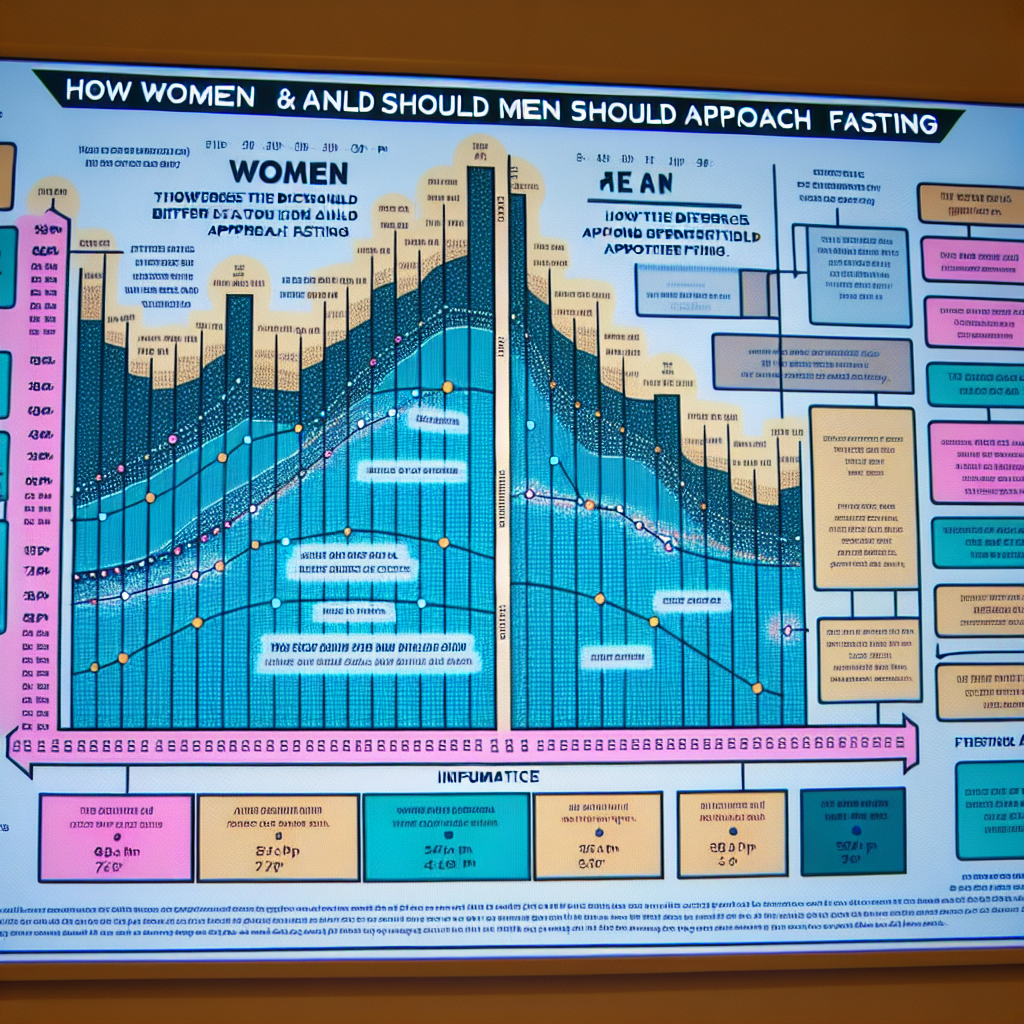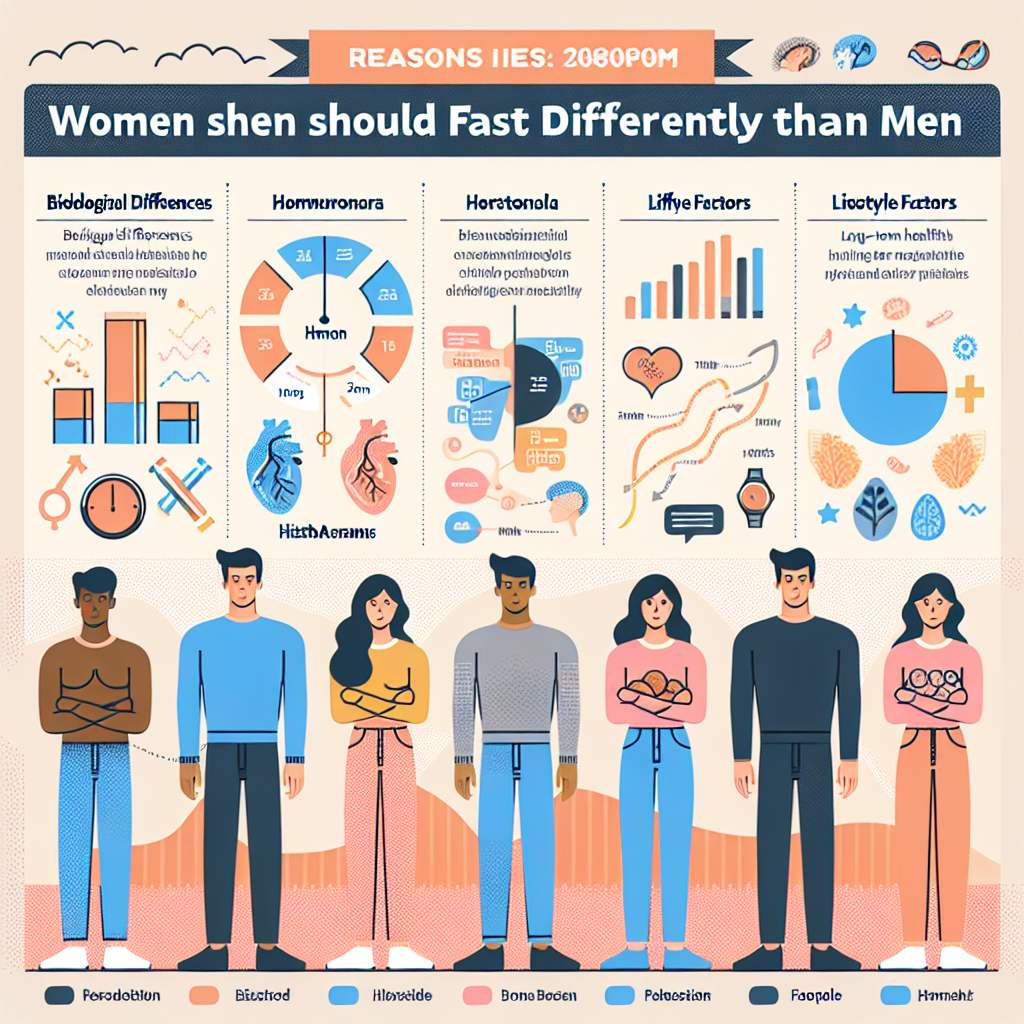Why Women Should Fast Differently Than Men

Discover why women should fast differently than men. Learn about the unique physiological differences and how they impact fasting. Empower your health journey today. Visit My Vibrant Vitality for more information.
Understanding the Biological Differences: Why Women Should Fast Differently Than Men
Fasting, a practice that has been around for centuries, has recently gained popularity as a method for weight loss and overall health improvement. While the benefits of fasting are well-documented, it’s important to note that the effects of fasting can vary greatly between men and women due to biological differences. This is why women should approach fasting differently than men.
The human body is a complex system that responds differently to fasting based on a variety of factors, including gender. The primary reason for this lies in the hormonal differences between men and women. Women’s bodies are designed to support pregnancy and childbirth, and as such, they are more sensitive to changes in energy intake. This sensitivity is largely due to the hormone leptin, which plays a crucial role in regulating energy balance and body weight. When women fast, their leptin levels drop significantly, which can lead to increased hunger and potential weight gain.
In contrast, men’s bodies respond to fasting by increasing the production of growth hormone, which aids in fat burning and muscle growth. This difference in hormonal response is one of the key reasons why men often see quicker results from fasting than women. However, this doesn’t mean that women can’t benefit from fasting. It simply means that they need to approach it differently.
For women, a gentler approach to fasting is often more beneficial. Instead of jumping into a strict fasting regimen, women might find it more effective to start with shorter fasts and gradually increase the duration over time. This allows the body to adjust to the changes in energy intake and can help prevent the negative side effects associated with sudden drops in leptin levels.
Another important consideration for women is the timing of their fasts. Women’s hormonal cycles can greatly impact their response to fasting. For instance, fasting during the luteal phase of the menstrual cycle, when progesterone levels are high, can lead to increased hunger and cravings. Therefore, it might be more beneficial for women to plan their fasts during the follicular phase of their cycle, when estrogen levels are higher and hunger is typically lower.
Lastly, it’s crucial for women to listen to their bodies when fasting. If fasting leads to negative symptoms such as fatigue, mood swings, or disruptions in menstrual cycles, it’s a clear sign that the body is not responding well to the fasting regimen. In such cases, it’s important to adjust the fasting schedule or consider other dietary approaches.
In conclusion, while fasting can offer numerous health benefits, it’s not a one-size-fits-all approach. The biological differences between men and women necessitate different fasting strategies. By understanding these differences and adjusting their fasting regimens accordingly, women can reap the benefits of fasting without the potential drawbacks. As with any dietary change, it’s always best to consult with a healthcare professional before starting a fasting regimen. This ensures that the approach is safe and suitable for the individual’s specific health needs and goals.
The Impact of Intermittent Fasting on Women’s Hormonal Health

Intermittent fasting, a popular dietary trend, has been lauded for its potential health benefits, including weight loss, improved metabolic health, and even a reduced risk of chronic diseases. However, it’s important to note that the effects of intermittent fasting can vary significantly between men and women, primarily due to differences in hormonal health.
Women’s bodies are incredibly sensitive to signals of starvation. When women fast, their bodies tend to increase the production of the hunger hormones leptin and ghrelin. This is a survival mechanism that has evolved over time to protect a potential fetus, even when the woman is not pregnant. This hormonal response can lead to increased hunger and cravings, making it more difficult for women to maintain the fast without feeling deprived.
Moreover, fasting can also impact a woman’s menstrual cycle. The female body requires a certain amount of stored energy to menstruate, and if this energy is not available due to prolonged fasting, it can lead to irregular periods or even amenorrhea, the absence of menstruation. This is particularly concerning for women of childbearing age, as it can potentially impact fertility.
Another hormone that can be affected by fasting in women is cortisol, the stress hormone. Studies have shown that intermittent fasting can increase cortisol levels in women, leading to disrupted sleep, mood swings, and even decreased immune function. This is in contrast to men, who typically experience a decrease in cortisol levels when fasting.
Despite these potential challenges, it’s not to say that women should avoid intermittent fasting altogether. Instead, they should approach it differently than men. For instance, women might consider a modified approach to intermittent fasting, such as the 5:2 diet, where they eat normally for five days of the week and restrict calories for two non-consecutive days. This approach can provide the benefits of fasting without triggering the body’s starvation response.
Another strategy is to incorporate more nutrient-dense foods into the diet during eating windows. This can help to ensure that the body is receiving adequate nutrition, even when calories are restricted. Foods rich in protein, healthy fats, and fiber can help to keep hunger at bay and stabilize blood sugar levels, making the fasting period easier to manage.
It’s also crucial for women to listen to their bodies when practicing intermittent fasting. If negative symptoms such as fatigue, dizziness, or irregular periods occur, it’s a clear sign that the body is not responding well to the fasting regimen. In such cases, it may be necessary to adjust the fasting schedule or consult with a healthcare professional.
In conclusion, while intermittent fasting can offer numerous health benefits, it’s essential for women to understand the potential impact on their hormonal health. By modifying their approach to fasting and paying close attention to their bodies’ signals, women can reap the benefits of intermittent fasting without compromising their hormonal health. As with any dietary change, it’s always best to consult with a healthcare professional before starting an intermittent fasting regimen.
Gender-Specific Fasting: The Unique Approach Women Should Take Towards Fasting
Fasting, a practice that has been around for centuries, has recently gained popularity as a method for weight loss and overall health improvement. While the benefits of fasting are well-documented, it’s important to note that the effects of fasting can vary greatly between genders. This is due to the unique physiological differences between men and women. Therefore, it’s crucial for women to approach fasting differently than men.
The primary reason why women should fast differently than men lies in the hormonal differences between the two genders. Women’s bodies are more sensitive to changes in diet and energy intake, primarily due to the role of the hormone estrogen. Estrogen plays a significant role in regulating a woman’s menstrual cycle, and drastic changes in diet, such as those brought about by fasting, can disrupt this cycle. This can lead to a range of issues, including irregular periods, hormonal imbalances, and even fertility problems.
Moreover, women’s bodies are designed to store more fat than men’s bodies, as a biological preparation for pregnancy. This means that women may not experience the same rapid weight loss effects from fasting as men do. In fact, fasting can sometimes lead to weight gain in women, as the body goes into ‘starvation mode’ and starts storing fat more aggressively.
Another key difference lies in the way men and women’s bodies respond to hunger. Men’s bodies are more likely to use stored fat for energy during periods of fasting, while women’s bodies are more likely to break down muscle tissue. This can lead to a loss of muscle mass in women who fast regularly, which can have negative effects on overall health and fitness levels.
Given these differences, it’s clear that women need to approach fasting with a different strategy than men. Instead of jumping into long periods of fasting, women should start with shorter fasts and gradually increase the duration over time. This allows the body to adjust to the changes in energy intake and can help prevent hormonal imbalances.
In addition, women should focus on maintaining a balanced diet during non-fasting periods. This means consuming a variety of nutrient-dense foods to ensure the body is getting all the necessary vitamins and minerals. This can help to counteract any potential nutrient deficiencies caused by fasting.
It’s also important for women to listen to their bodies during periods of fasting. If you start to feel unwell, or if your menstrual cycle becomes irregular, it’s a sign that you may need to adjust your fasting routine. Consulting with a healthcare professional can also provide valuable guidance and ensure that you’re fasting in a way that’s safe and beneficial for your body.
In conclusion, while fasting can offer numerous health benefits, it’s not a one-size-fits-all approach. Women, in particular, need to take a unique approach to fasting, taking into account their hormonal differences and the potential impacts on their health. By starting slow, maintaining a balanced diet, and listening to their bodies, women can reap the benefits of fasting while minimizing potential risks.